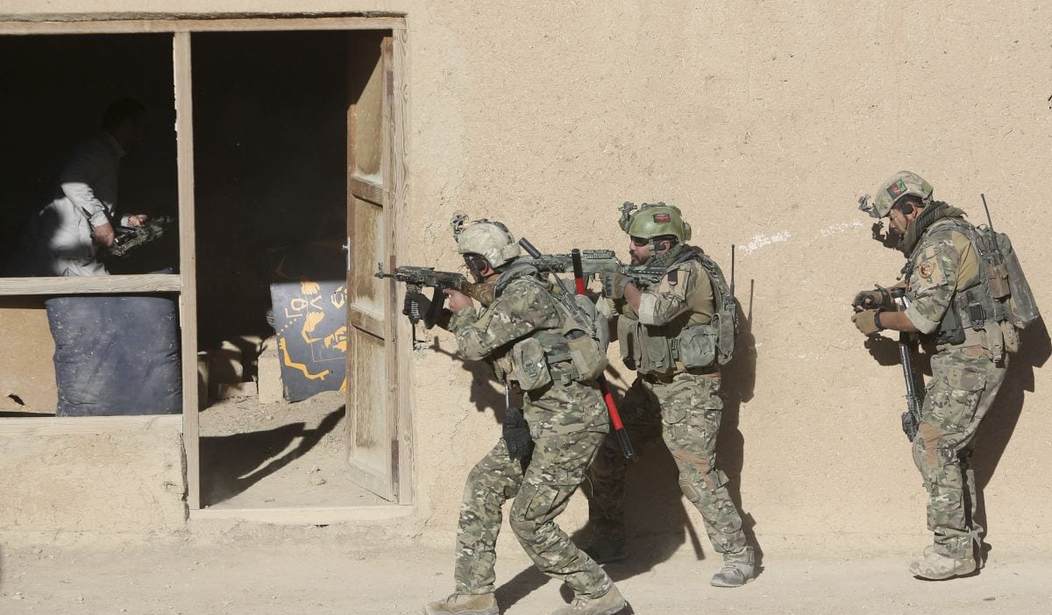An elite Taliban commando force known as “Red Unit” attacked several Afghan army units in a series of raids in mid-November, killing dozens. The commandos were outfitted with U.S.-made night vision goggles and employed tactics previously unseen. The raids had U.S. and Afghan defense officials worried because the Afghan army already had its hands full trying to keep the Taliban from overrunning several provinces.
But the first week in December, Afghan special forces and their U.S. advisers responded, taking out the leader of Red Unit and several of his top commanders in a precision strike. U.S. officials praised the Afghan special forces, saying the raid was proof of how far they’ve come in recent years.
“This operation is a testament to the real growth the Afghan forces have achieved over the past year,” said Army Gen. John Nicholson Jr., the commander of U.S. forces in Afghanistan, said in a statement. “It is also another example of the lethality of the undefeated Afghan Special Forces and the success of working side by side with our Afghan partners.”
The ethical value of Facebook-ready war porn notwithstanding, it’s clear that U.S. and Afghan military officials are pleased with the outcome of the strike, which neutralized not just Wali but one of the Red Unit’s deputy commanders and three other militant lieutenants “responsible for planning numerous suicide bombings, [IED] attacks, and coordinated assaults against civilians, Afghan and coalition forces,” NATO said in a statement.
The death of Wali and his lieutenants may temporarily disrupt Taliban operations in Helmand, a major Taliban stronghold and nexus of the opium and heroin trade that helps finance militant operations. As NATO Special Operations Component Command-Afghanistan said in a statement, the Red Unit is also responsible “for coordinating operations and supply of munitions, explosives, and materials for the Taliban” there.
But the trouble for Afghan soldiers is only beginning, according to many reports. The growing night fighting capability of the Taliban spells real trouble for the Afghan army.
But despite coalition and Afghan forces’ rush to tout a critical blow to the Taliban, Wali’s death won’t signal an end to the devastating nighttime raids that have demoralized Afghan security forces in recent months. In April, a series of propaganda videos captured Taliban fighters marching in formation outfitted with AN/PVS 7b night-vision goggles; the following July, another propaganda video showed fighters wielding M16 rifles and at least one 7.62mm FN Special Operations Forces Combat Assault Rifle (SCAR) decked out with enhanced optics and night-vision-enabled accessories. The highly trained commandos of the Red Unit are more lethal than the standard cannon fodder, but night-vision capabilities are becoming quickly ubiquitous throughout the Taliban ranks.
This problem won’t disappear overnight. As Adam Raymond reported for Task & Purpose in July, the Pentagon has ignored the Taliban’s emerging night-vision capabilities for years: During the grueling middle years of the Global War on Terror, U.S.-led forces barely ever encountered militants who exhibited extensive combat training with night-vision devices, “nor did they fully grasp how much the U.S.’s night vision capability had improved, leaving them unaware that they were just as visible in the darkness as they were in daytime.”
Where does the Taliban get all this U.S. equipment? Partly on the black market, where massive corruption meets entrepreneurial genius. But most of it comes from raids on Afghan police and military units who still run away at the first sight of the Taliban. Vehicles, weapons, and accessories like high-powered sniper scopes and night vision goggles have fallen into the Taliban’s lap thanks to the inconstancy of Afghan security forces.
The recent small increase in U.S. trainers in Afghanistan will be assisting the Afghan air force and augmenting ground support capabilities. But it won’t help that Afghan soldier who is at a huge disadvantage at night when Taliban soldiers attack.










Join the conversation as a VIP Member